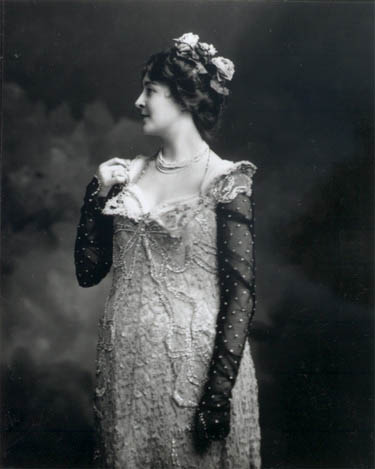Miss Clements
made her stage debut in 1893 in Dion Boucicault's The Octaroonat
the Theatre Royal in Margate, England. In that same venue she
played Juliet in 1893. Her next Shakespeare part was in London at
Her Majesty's Theatre where she played Hippolyta in A Midsummer
Night's Dream in 1900. Her last recorded performance in a play
by Shakespeare is as Hero in Much Ado About Nothing at His
Majesty's Theatre, London, in 1905.
Source: http://shakespeare.emory.edu/actordisplay.cfm?actorid=207
The Candid
Friend,
10 August 1901, p 589
Miss Miriam
Clements expresses the splendour of life. She recalls the rich and
glowing personages of the Venetian painters. She is made to bear
jewels and brocades and the sumtuous garments of the pictorial ages.
I imagine her
as the consort of one of Alexander's generals, and I can see her
contending with other consorts over the partition of Alexander's
empire. She could refuse a province and claim a kingdom with the
insolent confidence of Marlowe's women. Her figure is tall and stately,
her movements have freedom and dignity, and her features are more
ready to express the primary emotions than th shades of feeling.
I have to insist
on Miss Clements' appearance, because, so far, she has not been
given the parts that fit her temperament; and I use that expression
deliberately, because I think Miss Clements has a temperament to
reveal, and that in that revelation is her opportunity as an actress.
The character in "My Friend the Prince" was not the right
one for Miss Clements, but in "A Court Scandal" she aroused
hopes scarecely fulfilled by her Hippolyta in "A Midsummer
Night's Dream."
The cast
of "A Court Scandal" is memorable for the beauty of the
women. There were Miss Dorothea Baird, Miss Ethel Matthews, and
Miss Miriam Clements. A more thorough and felicitous contrast it
would be hard to find. And they were as different in their styles
of acting as they were in their appearance. Miss Clement's part
was not the longest, but she made it stand out, and aroused the
hopes I have already spoken of.
Those hopes
are not abandoned. I feel sure that an actress who has so well justified
her promotion from the lyric stage can do more than Miss Clements
has yet done. But I do not know that acting holds the first place
in her affections. She has a great capacity for enjoyment, and is
much interested in improving the English thoroughbred. Quidquid
agunt homines seems to be her motto; a kindly and tolerant
motto certainly, but one that conflicts with the exclusive devotion
which art requires.
